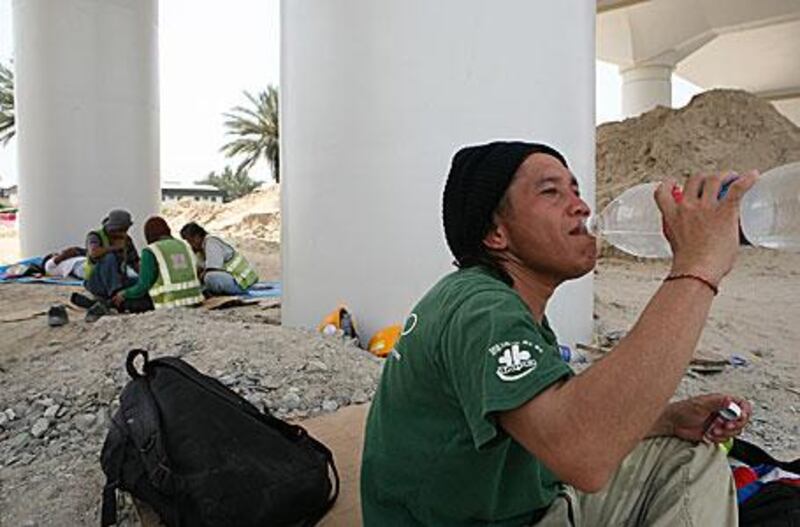Fasting Muslims are being urged to drink plenty of fluids at night as hospitals prepare for a surge in cases of dehydration. An increase in patients suffering from hypoglycemia (low blood sugar) and heat exhaustion is also expected as the holy month falls during high summer for the first time in 30 years.
Debbie Arquisole, a nurse at Al Mafraq Hospital in Abu Dhabi, said in a typical day the emergency department would treat about 300 patients. During Ramadan, fasting leads to a doubling in the incidence of cases of heat exhaustion and dehydration, to about 60 a day. "In general, many of the patients are suffering from dehydration," she said. "Labourers who are fasting are particularly vulnerable to dehydration and heat exhaustion. We see mostly labourers during the days."
Doctors say children, outside workers and diabetics are at particular risk of dehydration. Christine Cadavero, 53, a nurse at Al Noor Hospital in Musaffah, warned that children could die of dehydration within four hours. "The weather here can lead to serious medical problems," she said. "Dehydration can lead to fever, nausea, vomiting, diarrhoea, the skin dries out. It's serious." People should aim to take in three litres of water daily, said Ellen Edwards, the head of the clinical dietetics department and chief clinical dietician at Sheikh Khalifa Medical City in the capital.
While the hospital's annual healthy Ramadan guide usually focused on watching food portions, Ms Edwards said this year's edition emphasised the importance of retaining fluids amid the summer heat. She added: "There's two ways people can do it: either just drink three litres of fluid - water, fruit, juice - or they can calculate their own fluid requirements, which is 35ml per kilogram of body weight, roughly two tablespoons per kilogram of body weight."
People suffering dehydration are usually treated using intravenous tubes. Medication can also be administered orally. Eating fresh fruit and vegetables is one way to build up water intake, according to Dalia Shukri, a clinical dietician at the American Hospital Dubai."Consuming two to three litres a day is hard to fit in when you're fasting," she said. However, "it's not that difficult if you divide it up and go for fruits and vegetables, which have a high content of water in them."
Anyone fasting should avoid diuretics such as soft drinks, tea and coffee, Ms Shukri said, as those beverages stimulated the body to expel water. Dr Aijaz Lone, 31, a general practitioner at the National Hospital in Abu Dhabi, warned of the dangers of eating too quickly when breaking one's fast. During fasting, blood circulation in the stomach slows. When the fast is broken, the slower blood rate makes it more difficult for the body to break down and absorb food, which means more of what is eaten will be converted into fat.
Eating too much, too quickly can cause stomachache - one ailment doctors see more of during Ramadan. "The blood supply to the stomach is renewed gradually after fasting, so food should be consumed slower upon breaking the fast," Dr Lone said. "The system cannot cope with overeating; people should try to consume smaller quantities in the evenings." According to Dr Lone, spicy food should also be avoided during Ramadan. He recommended apples, bananas and dates as ideal foods for the morning.
Dr Lone also alerted people fasting against "silent dehydration". "Air conditioners dehydrate you as well, so you need to compensate against this as well with your water intake" he said. Ms Edwards said breaking the fast with a few dates and a bottle of water or a cup of soup was a good way to start, rather than eating the main iftar meal straight away. "In the brain, you can get a message of confusion between when you are thirsty versus when you are hungry," she said.
"Some people think they're hungry when all they really are is thirsty." While some people feared they would put on weight during Ramadan because they spent more time socialising, that need not be the case, according to Ms Shukri. She said the holy month was actually a good opportunity to kick-start healthy dieting, which gets easier after the first week as the stomach shrinks and appetites decrease.
"People should take advantage of this time because you can actually lose weight if you follow a healthy eating plan," Ms Shukri said. "Think of it as a healthy month. It's about cleansing, it's a disciplined month, so what's the point of fasting if you're just going to gorge at the end of the day?" jhume@thenational.ae mkwong@thenational.ae





